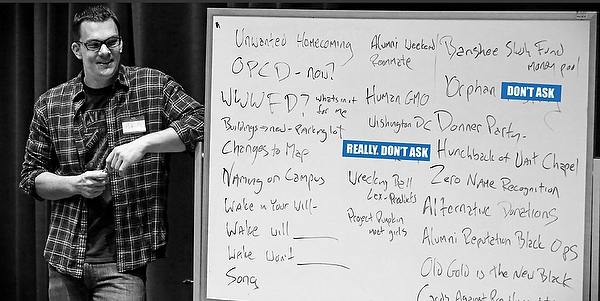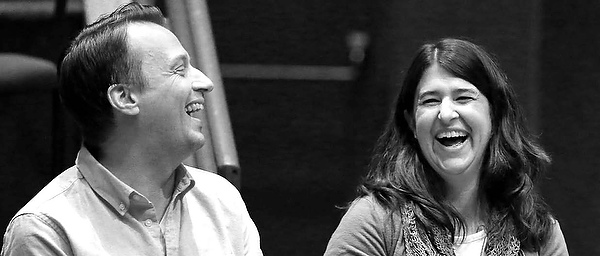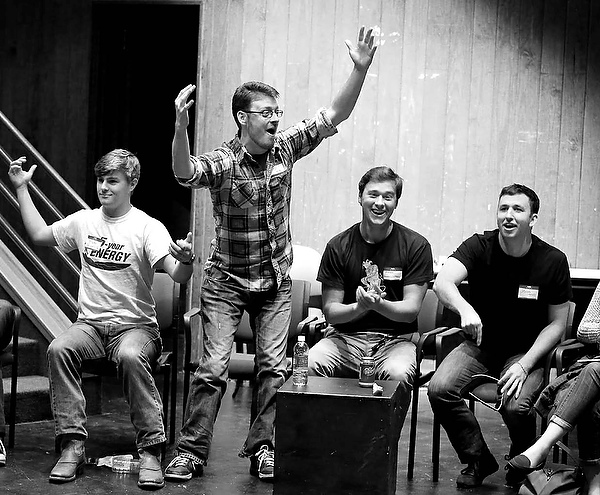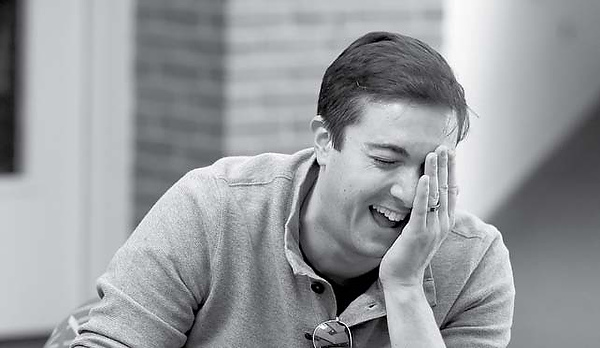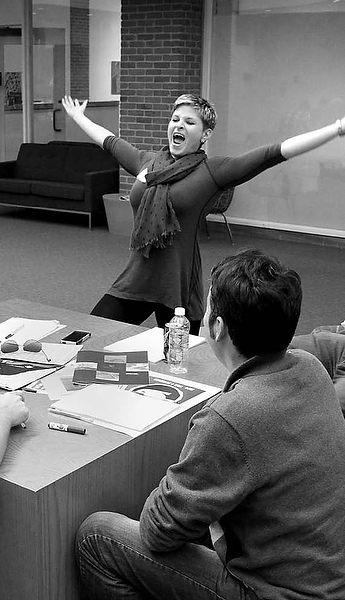When Will Volker (’05, MSA ’06), tax accountant, speaks to a group he likes to open with a foolproof one-liner: “Do you know how to tell an extroverted accountant? He looks at your shoes instead of the floor.”
When sometimes-shy Jess Morris Adams (’09) wants to make her opinion heard, she draws upon the self-confidence gained from dancing across the Brendle Recital Hall stage in her unmentionables. For the Rev. Jordan Wong (’99), making a point from the pulpit is sometimes best accomplished with the aid of costumes and power tools. And when college professor Adrian Greene (’00, MA ’08) teaches romantic irony, nothing illustrates it better than a lighthearted parody of teen TV’s “Saved by the Bell.”
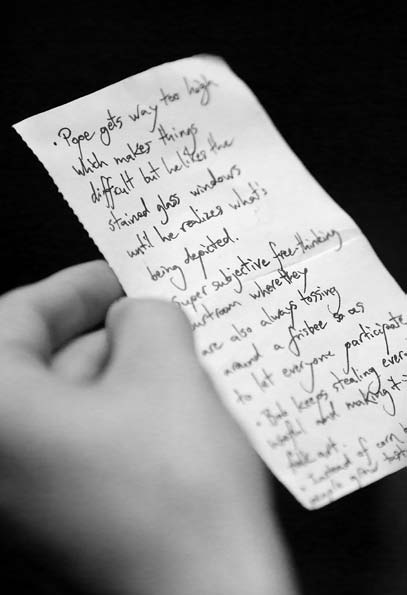 Offbeat, you say? In dubious taste, perhaps? Bizarre, even? Excellent! You have just bestowed the ultimate compliment upon these alumni cast members of the Lilting Banshees, Wake Forest’s notorious, uproarious student-run comedy troupe known for wondrous wit, colorful humor and silly — often stinging — satire of life at Mother, so dear.
Offbeat, you say? In dubious taste, perhaps? Bizarre, even? Excellent! You have just bestowed the ultimate compliment upon these alumni cast members of the Lilting Banshees, Wake Forest’s notorious, uproarious student-run comedy troupe known for wondrous wit, colorful humor and silly — often stinging — satire of life at Mother, so dear.
It has been a few years since they mocked administrators, skewered Pit food or devoted a sketch to how campus might look had it been built by the Amish. These days the Banshees’ more than 200 alumni, several of whom we caught up with, include successful journalists, authors, educators, spouses, accountants, copywriters, marketers, musicians, stand-up comics, ministers, parents, performers and architects, as well as those who work in government and nonprofits.
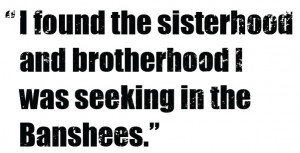 Now dealing with grown-up things like mortgages, jobs (or lack of them), family and civic responsibilities, they say humor — and the friendships they formed — are more important in their lives and careers than ever before. Looking back, they realize it was during their more immature moments that they matured, learning collaboration, courage, humility, patience, teamwork and self-confidence. The Banshees motto, “If you can’t laugh at yourself, you can’t laugh at yourself,” continues to be a guiding principle.
Now dealing with grown-up things like mortgages, jobs (or lack of them), family and civic responsibilities, they say humor — and the friendships they formed — are more important in their lives and careers than ever before. Looking back, they realize it was during their more immature moments that they matured, learning collaboration, courage, humility, patience, teamwork and self-confidence. The Banshees motto, “If you can’t laugh at yourself, you can’t laugh at yourself,” continues to be a guiding principle.
Laughing at themselves was what they did best and what they wanted to help Wake Forest do, say alumni, many of whom returned to campus last fall for a reunion celebrating the Banshees’ 20th anniversary. While they pushed the limits of good taste to the G-rated borders of the campus they lampooned, their brand of comedy was rooted in love and respect for the University. There was (usually) a method to the madness in good-natured parodies of campus life — chem lab, campus security and frat parties — or affectionate pokes at distinguished personalities (remember Shane Harris (’98) as Ed Christman (’50, JD ’53) or Kevin Gamble (’03) as Maya Angelou?)
 Using outrageous humor to challenge stereotypes, encourage conversations and ease tensions not only provided a tremendous creative outlet for the writers, performers and technical staff — it also brought together, under the umbrella of laughter, a campus community from diverse social, economical and political backgrounds.
Using outrageous humor to challenge stereotypes, encourage conversations and ease tensions not only provided a tremendous creative outlet for the writers, performers and technical staff — it also brought together, under the umbrella of laughter, a campus community from diverse social, economical and political backgrounds.
“We tapped into something that every college needs, and that’s why it stuck around,” says Ben Tomlin (’94), considered the troupe’s lead founder. “It was a chance to speak truth to the power and do it in an entertaining way.” Though the troupe’s relationship with the administration was strained at times, Tomlin says it was not the intention nor the heart of the Banshees to do anything — even in mocking — but to share the love for Wake Forest, adding, “Part of the act of pushing boundaries is occasionally stepping over them.”
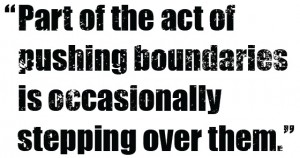 The Wake Forest version of “Saturday Night Live” got its start when late-night comedy was in its prime and poking good-natured fun at one’s self and others was gaining popularity as a national pastime. Tomlin, then active in theatre, wanted a venue to write and perform original content. In October 1992 several friends who were members of the Anthony Aston Players performed in a scripted Halloween-themed show. That gave Tomlin an idea: why not form a group and do our own material? In February 1993 he and some classmates dubbed themselves the Lilting Banshees — the name based on a CD of Irish harp music he saw in the theatre department sound booth — and staged their first show, whimsically titled “In Search of a Corner” because the Ring Theatre back then was in the round.
The Wake Forest version of “Saturday Night Live” got its start when late-night comedy was in its prime and poking good-natured fun at one’s self and others was gaining popularity as a national pastime. Tomlin, then active in theatre, wanted a venue to write and perform original content. In October 1992 several friends who were members of the Anthony Aston Players performed in a scripted Halloween-themed show. That gave Tomlin an idea: why not form a group and do our own material? In February 1993 he and some classmates dubbed themselves the Lilting Banshees — the name based on a CD of Irish harp music he saw in the theatre department sound booth — and staged their first show, whimsically titled “In Search of a Corner” because the Ring Theatre back then was in the round.
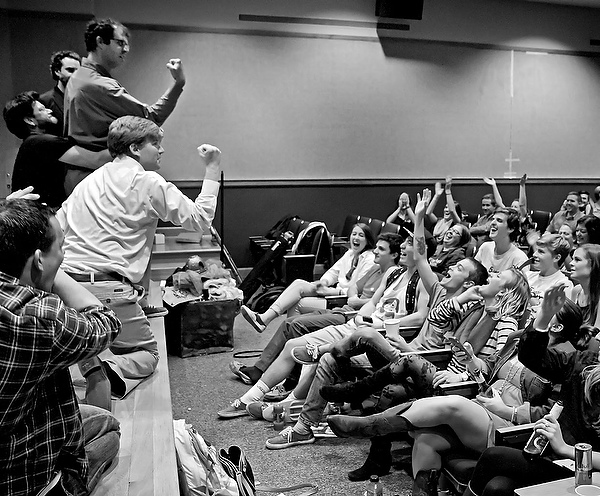
Performers wore khaki pants and white Oxford shirts, which became the official uniform, and several cast members, including founding member Matt Jones (’96), collaborated on the signature logo — an adaptation of Rodin’s “The Thinker,” wearing a jester’s cap — eventually designed by Ingrid Foncea Driggers (’95).
The group’s reputation grew, as did audiences for their twice-yearly shows. Making the Banshees cast became a competitive audition process, and many who succeeded achieved “rock star” status on campus. The group embraced diversity — seasoned writers/performers and novices, geeks and Greeks, student-athletes, scholars, extroverts and introverts — the goal was to find those with the greatest talent for making people laugh. It also embraced freedom of speech and eventually chartered as an independent organization, paying its own expenses, including rental of Brendle Recital Hall.
“From the moment I stepped into the Banshees I grew every day,” says Sarah Schneider (’05), who from the time she was old enough to watch it dreamed of writing for “Saturday Night Live.” Her dream came true in 2011 when she joined the comedy powerhouse fulltime. “When you’re working together in close quarters laughter is a strong bond,” says Schneider, who worked for CollegeHumor.com in New York before moving to her new office at 30 Rockefeller Plaza. “When you find people who share the same sense of humor you cling to them for the rest of your life. It was the single most valuable thing I did at school for where I am now.”
 Veterans of the self-described “island of misfits,” “subversive culture” and “alternative scene” recall the group as a family — indeed a refuge — for those in search of their own personal corner. They reveled in the company of quirky kindred spirits, sharing witty and sometimes-profane wars of words over late-night pizza washed down by creative energy drinks.
Veterans of the self-described “island of misfits,” “subversive culture” and “alternative scene” recall the group as a family — indeed a refuge — for those in search of their own personal corner. They reveled in the company of quirky kindred spirits, sharing witty and sometimes-profane wars of words over late-night pizza washed down by creative energy drinks.
“I remember the crushing anxiety of my first week of college — terror at not fitting in, uncertainty what to do and who to befriend and how to survive,” says Susannah Rosenblatt (’03), who met her husband, Aaron Winter (’02), in the Banshees. “And that first show was a revelation: these people cracking jokes GOT ME. They were weird! And funny! And understood Wake’s quirks! And everybody loved them! I knew I wanted to join them.”
All the debates they had inside the comedy troupe about which sketches to put on and how to select new cast members were actually a great preparation for grown-up life, says Winter. “You disagree with someone, but you love them and respect them. That’s a good lesson when you’re 19.”
Memories of falling asleep at computers while crafting jokes that would bring the house down, or baring their souls with a sketch that might bomb embarrassingly but would do so among friends, are among the best of their college experiences, if not their lives.
The Banshees could have been an ego-driven experience but instead it was all about collegiality and working together, says Greene, whose theatre voice and flair for the dramatic serve him well in the classroom, as they did in the Wake Forest admissions office when he hosted popular information sessions for prospective students and families. “It came down to who could make us laugh — that was the bottom line. There were great communal moments.”
Those moments forged unbreakable bonds. These days mention one Banshee’s name to another and listen to the excitement in their voices as they recount a hilarious moment then erupt into laughter — the kind that briefly absolves them of adult responsibilities and puts them back in the Scales “war room” or under the spotlights at Brendle. Lifelong friendships, professional collaborations, romances, marriages and — in the case of Scott (’96) and Jenny Harrison (’98) Bunn, “full-blooded Banshees children” — these are the ties that continue to bind.
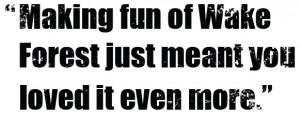 For each one, the journey of self-expression and discovery, along with the people they met, were life-changing. So much so for Jelisa Castrodale (’01) that the experience made the difference between continuing at, or leaving, Wake Forest. “I didn’t bring any long-sleeved shirts,” says Castrodale, who planned to transfer after her first semester. “Then I found the Banshees and I was like, ‘I can’t leave these people.’ So I stayed.”
For each one, the journey of self-expression and discovery, along with the people they met, were life-changing. So much so for Jelisa Castrodale (’01) that the experience made the difference between continuing at, or leaving, Wake Forest. “I didn’t bring any long-sleeved shirts,” says Castrodale, who planned to transfer after her first semester. “Then I found the Banshees and I was like, ‘I can’t leave these people.’ So I stayed.”
Read Banshees alumni profiles below and even more here.
Ben Tomlin (’94)
Glendale, Calif. | Marketing and communications, California Institute of Technology
As a theatre student Ben Tomlin wanted the opportunity to write and perform his own material, so in February 1993 he and some classmates dubbed themselves the Lilting Banshees and produced a midnight sketch comedy show in the Ring Theatre. The group realized they were on to something — an eclectic band of brothers and sisters who shared a certain sense of humor and a talent for making people laugh. Regarded as the troupe’s driving force and principal founding member, Ben acknowledges the troupe’s writing and acting talent was so strong that he was never the funniest person in the room. These days he and other Banshees alumni are looking to the future, exploring ways to formalize professional networking and create opportunities for troupe members past, present and future. “No one is more surprised than me that this thing has been going for 20 years, and if it’s going to keep going, what does that look like? We need to send the elevator back down,” he says, “and start that pipeline into entertainment and writing circles.”
Jenny Harrison Bunn (’98)
Asheville, N.C. | Marketing director, Asheville Community Theatre
“If ever there’s a lesson I learned from the Banshees it is to ‘keep it light,’ ” says Jenny, a theatre major who met her future husband, Scott Bunn (’96), when they auditioned the same year. “The experience taught me a lot about how to make decisions on the fly and stand behind them.” In her job she promotes theatre productions, manages social media and works with volunteers. She organized an all-female comedy troupe in Asheville and says time management and a sense of humor have been essential to her professional and personal success. “I pledged a sorority and was in one for about six weeks, but a sorority never made as much sense to me personally as inclusion in the comedy troupe,” Jenny says. “I found the sisterhood and brotherhood I was seeking in the Banshees.” Castmates remain her closest friends, and she is the godmother of Kristen Eppley England’s (’98) child. “I have very much kept those laughing-til-you-cry and-have-to-hold-on-to-something moments. I would encourage anyone who can to marry a Banshee. That’s worked out well for me.”
Alison Delaney (’04)
New York, N.Y. | Marketing associate
As a former charity auctioneer at New York’s Christie’s auction house, Alison Delaney credits the Lilting Banshees for the ability to think on her feet and to use timing and humor to manage fast-changing situations. As it was on the Brendle stage, so it was selling fine art, jewelry and luxury vacations. “There’s nothing worse than a quiet room, and your job is to create energy and action,” she says. “I’m definitely not using some of the Banshee jokes but the same sort of steadfastness and thinking on your feet — using timing and humor to drive up the bid and excite the crowd.” Delaney, who met her husband, Aaron Bokros (’02) when he was Banshees stage manager, remembers being cast as CNN’s veteran news anchor Wolf Blitzer and having to wear a terrible black wig. “I had to go all out,” she says, “because as an 18-year-old girl from Long Island I knew if I could do Wolf Blitzer I could do anything.”
Mike Baireuther (’08)
Silver Spring, Md. | Supervising producer, Discovery Communications
In the classroom Mike Baireuther learned about history, entrepreneurship and journalism. As a Lilting Banshees writer and director, he learned about working as a team, not taking it too personally when ideas don’t pan out — and directing one’s friends who are both creative and vulnerable. “My job was to take a bunch of ideas, prioritize them, give the writers guidance and not alienate them,” he says. Today he is a driving force behind creative communications (think “Shark Week” commercials!) for Discovery Channel and The Learning Channel. “Nothing prepared me like the Banshees did,” he says. “That experience taught me everything I know, and I use it on a daily basis.” Mike, who worked for TNT and TBS before taking his current job, moonlights as a storyteller with a regular following in the Washington, D.C., area. He remembers playing President Nathan Hatch on a magical “date” with the Deacon; then there was the Shakespearean frat party sketch with its “fair maiden in boots of UGG … ” The Banshees shaped his work ethic as a professional writer. “If I write a tagline for ‘Deadliest Catch’ I do the same thing I would do when writing for the Banshees,” he says. “Grind down and push harder.”
Brian Sloan (’95)
New York, N.Y. | Comedian, actor, storyteller
One of the original Banshees cast members, Brian Sloan, calls New York City home and drives a truck by day so he can do what he loves by night: writing, acting and stand-up comedy. “What was great about Wake was that they let us do this,” says the radio-voiced Sloan, who was classically trained as an actor in London (while living in Professor of Theatre James Dodding’s flat.) He expects his most-remembered character would be Sgt. Mike Dennison, special agent in the Shimmering Blue Pants division of campus security, whose signature uniform was a trench coat, Fedora and blue jogging pants. “The commonality was all the kids who grew up on Monty Python and ‘SNL.’ That group of actors are still my closest friends,” he says. “When we get together the stories start flying and it seems like the whole troupe is back in the room again.”
Shane Harris (’98)
Washington, D.C. | Senior staff writer, Foreign Policy magazine
“After graduation I knew I wanted to write. Perform, no,” says Shane, a Banshees writer/performer who also directed the troupe his senior year. He remains revered among fellow cast members for his leadership and his parody of then-Chaplain Ed Christman’s (’50, JD ’53) annual “What’s in a Name?” freshman orientation speech. Shane describes his performance, called “Holy Melee,” as “a speech that got progressively ludicrous and inane with references to ‘Star Wars’.” Now a political writer in the nation’s capital, he applies the discipline, technique and craft he learned in the Banshees to long-form journalism. Shane won the 2010 Gerald R. Ford Journalism Prize for his reporting on national defense in Washingtonian magazine and is author of “The Watchers: The Rise of America’s Surveillance State,” named one of the Best Books of 2010 by The Economist; his forthcoming book is about cyberwarfare. He says humor is essential to his life and career. “If you view the world through that lens — trying to find humor in something — it can be an antidote to stuff that is deeply serious or depressing. Comedy is a lot harder to do than drama; it reveals what’s really operating under the surface, and in this town no one really says what they mean.”
Jordan Wong (’99)
San Jose, Calif. | Pastor, Almaden Neighborhood Church
Each week the Rev. Jordan Wong delivers a 40-minute monologue from the pulpit, using the concepts of timing and pacing that he learned writing and performing sketches for the Lilting Banshees. He brings in characters, wears costumes and uses props such as power tools to unleash a sense of the unexpected that he hopes will make his Sunday messages stick. “Some of it is the fearlessness I learned in the Banshees — and the creativity,” says Jordan, who joined Christian-based groups at Wake and was one of the first to omit curse words from his audition routine. As a performer he took pride in being able to make people laugh without using profanity. The troupe was his big, diverse family that thrived on pushing intellectual, cultural and politically correct boundaries — in part to raise awareness and in part to ease tensions — with sketches like “Jihad on the Quad” or another in which Jordan — the troupe’s sole Asian member at the time — wore a coolie hat and pulled a rickshaw across stage. “Would I do the sketches today that I did then? Probably not,” he says. “But we respected each other. You have to be able to have the freedom to go there.”
Sarah Schneider (’05)
Brooklyn, N.Y. | Writer, “Saturday Night Live”
Ever since she could stay up late enough to watch it, Sarah Schneider’s dream was to be a writer for “Saturday Night Live.” The path to that dream, which became a reality in 2011, led the communications major to the Lilting Banshees, for which she auditioned on a whim. “We had to write a sketch that encompassed three random things — I think mine were Grimace from McDonald’s, a Ford Pinto and something else … so much of what I use now came from the Banshees … learning to work in a group, pitching jokes off someone’s ideas,” says the four-time Emmy nominee who confesses to being bookish as a kid and not very funny. These days Sarah and the SNL writing team meet the celebrity host on Monday to pitch sketch and monologue — “the monologue is notoriously one of the harder things to write … an idea that works for Maya Rudolph isn’t going to work for Justin Bieber,” she says. They write sketches Tuesday and Wednesday (sometimes pairing up with actors and producing as many as five a night), and begin rehearsals on Thursday. It’s a little more solitary than the collaborative Banshees process, Sarah says, but she has more ownership of her material. The first sketch she co-wrote was “Knights of the Realm,” featuring Sir Elton John (“he was larger than life”) and Tom Hanks, in which England’s most recognizable knights devise a plan to stop a dragon attack on London. “From the moment I stepped into the Banshees I grew every day. That’s how it is now. I’m still honing my sensibilities — that’s key to having a fresh perspective when the comedy scene is constantly changing.”
Jess Morris Adams (’09)
Jamestown, N.C. | Project coordinator, Technology Concepts & Design Inc.
“Humor is not my job but I use it to keep me sane,” says Jess, a chemistry major introduced to the Banshees by her brother, Jacob Morris (’04), who preceded her as a troupe member. Painfully shy when she came to Wake Forest, she almost never left her room for the first two weeks but somehow got up the courage to audition, giving what she calls a dreadful monologue. Writers collaborated in “war rooms” — she describes those sessions as training for working with other people and making sure your opinion gets heard. “It definitely required a lot of discipline and a thick skin, but it brought me out of my shell. Sometimes I still revert back to that time when I get nervous. I mean, I’ve pranced around stage in my underwear. What could be scarier than that?” The shy girl went on to help write the character known as “Mr. Mom,” meant to be played by a man in drag. But she liked the role so much she cast herself in it. “It was about a mother who is so attached to her daughter she moves into college with her and takes over her life and then spends all four years with her,” says Jess. “And yes, my mom came to all the shows.”
Will Volker (BS/MSA ’06)
Raleigh, N.C. | Partner and tax accountant, Efficiency Energy LLC
Will Volker uses humor to help convince people twice his age that he’s an expert in the management of taxpayer dollars invested in energy efficient buildings. “I tell jokes all the time because it’s such a tedious subject,” he says with a laugh. Will, who started Efficiency Energy from a business plan written during his MSA independent research course, is a tax accountant and came to Wake Forest for the Calloway School and also to play club lacrosse; he auditioned for the Banshees with his sophomore roommate. He still keeps scripts in his office and has a photo of the posted cast list representing the moment he knew he was a Banshee. His wife, Molly Conti (’06), reminds him that “the first time she laid eyes on me I was wearing a loincloth on stage.” The Banshees code was that you had to be able to dish it out and you also had to be able to take it, says Volker, whose favorite memories are parodies of Chaplain Ed Christman’s (’50, JD ’53) “What’s In a Name?” speech and a poem on veganism by Susannah Rosenblatt (’03). Though the humor could be pointed and shocking for its time, Volker says the troupe’s infamous neon yellow promotional flyers were a metaphor for the group’s motto, “If you can’t laugh at yourself, you can’t laugh at yourself.” “We used blue painters’ tape (to attach them to surfaces) because we didn’t want them to cause damage,” he says. “It was kind of how you could look at the jokes as well.”
Andy Ferguson (’98)
New York, N.Y. | Film and television writer
In a 2007 “This is SportsCenter” commercial titled “Secrets,” writer and Banshee alum Andy Ferguson stayed true to his school by featuring a curious Demon Deacon vexed by a “mitt-over-mouth” conversation between ESPN anchors and New York Mets third-baseman David Wright. It was one of several projects in which Ferguson, who worked for ESPN and Nike at a major New York ad agency before becoming a freelance TV and film writer, worked in a reference to his alma mater. Andy saw the show freshman year and was stunned at how good it was; he auditioned and made the troupe his sophomore year. “The Banshees experience was one of the highlights of my Wake Forest career,” he says. “It was great affirmation and a confidence boost to get into the troupe and for other people to identify you as funny.” While their goal was to make fun of Wake Forest, he notes, the group shared an appreciation for a University that gave them the freedom to be creative, provocative and just plain silly. “For people who like to laugh there’s nothing like being around people who make you laugh. The thing I remember most was the camaraderie.”
Geoffrey Barton (’05)
Asheville, N.C. | Enterprise Rose Architectural Fellow, Mountain Housing Opportunities
Being a four-year Banshee meant writing and pitching jokes for three hours a night, four to five nights a week — and additional time rehearsing, blocking and performing the actual show. Geoff was one of many students who spent as much time — if not more — on Banshees as he did on academics. And he doesn’t regret a minute of it. Today he acknowledges it’s a stretch to make a connection between the Banshees and affordable housing, but in his career keeping a sense of humor is helpful. “We’re working with some pretty serious social issues so being able to put the clown nose on once in a while is a good skill to have,” says Geoff, who was troupe director his senior year. His most memorable role? Playing then-President Thomas K. Hearn Jr. as an “American Idol” judge. Hearn, he says, was a big supporter of the troupe and even made a cameo appearance that brought the house down. “We did single out campus characters but not individual students. We walked a tough line between being a satire group and not satirizing things that needed to be left alone,” Geoff notes. “Sometimes we were aggressive but it was all out of love. The amount of time we spent writing shows was a huge testament to that.”
Marc Lucente (’01)
Milford, Conn. | Doctor of chiropractic
As a chiropractic physician Marc Lucente uses manual therapy and hands-on techniques to help his patients feel better and stay better. To achieve similar results with his staff, he uses humor. “I act goofy and keep the workplace fun,” he says. “When people around you are happy they are more productive.” Marc, a troupe member who was director for 1999-2000, had done high school musicals but no comedy when he caught the “Welcome to Wake” show his freshman year and thought “I could do that.” He auditioned but forgot to check the cast list and didn’t know he made the Banshees until he got a call from then-director Shane Harris (’98). “For the next four years it defined me,” Marc says. “We had rehearsals for three hours a night and it was hardcore. Casting, blocking, music … everything was controlled by the students. We would perform for 1,100 kids at a time. Nothing made me happier than being on stage and making a group laugh.” To this day he loves carrying a room — put him on stage or invite him to make a speech at a wedding. “That started with the Banshees and never left.”
Scott Bunn (’96)
Asheville, N.C. | Director of development, Appalachian Sustainable Agriculture Project
Scott Bunn was a Banshees groupie long before he auditioned in his senior year and made the cast. “It was so great to wait in line on a Saturday night for the show … it was a big deal.” He had done some writing and with his WAKE radio voice, added voiceover to what many describe as a legendary series of sketches about campus security. (Remember Brian Sloan (’95) as Detective Mike Dennison in shimmering blue pants?) But his first official performance was during his senior year; the glow of stage lights and roar of the crowd, and “the feeling of being a rock star on campus” were addictive, and Scott knew he wanted to keep performing comedy. After graduation he was one of several Banshees who moved to California and performed sketch comedy, with varying levels of success. His favorite moments involved spoofs of Greek life — men holding hands and having candle ceremonies, women sitting on a wall wearing baseball hats and “checking out the scenery.” Then there was a cameo by Professor of Health and Exercise Science Bill Hottinger (P ’88), known for his healthy lifestyle, who walked on stage carrying a plate of barbecue. “I use comedy as much as I can; I need to connect with people and establish relationships, and humor is a great way to do that,” says Scott, who notes writing skills he learned as a Banshee help him with grant proposals for nonprofits. “Making fun of Wake Forest just meant you loved it even more.”
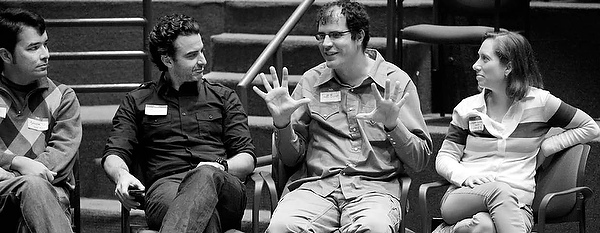
Left to right: Darren Linvill (’99, MA ’02), founding member Paul Sonderegger (’94), Scott Bunn (’96), and Ellizabeth Thalhimer Smartt (’98).
Ethan Trex (Dougherty) (’04)
Brooklyn, N.Y. | Editorial Director, Mental Floss
Ethan Trex really wanted to write funny stuff for a living but since the career prospects were “iffy” at best, he went to grad school to pursue a doctorate in economics. “Kind of the opposite of comedy,” says Ethan, who has written comedy books — including one with fellow Banshee Sarah Schneider (’05) — and kept getting humor-writing gigs for magazines and websites to the point he realized it was a viable career path. He quit school to write full-time and became editorial director for Mental Floss, which he describes as “a geeky magazine that uses humor to make science, history and cultural stories more fun and accessible.” The Banshees turned out to be the world’s nicest people and were patient in teaching him how to act well enough not to sink a sketch. “There were a lot of good lessons I learned from the troupe: think analytically about whether or not something’s as funny as it could be, don’t be afraid to rewrite/polish/edit until you’ve got the thing you’re working on to your liking, and remember to trust your writing partners,” says Trex, who was known as Ethan Dougherty in his student days. “More than anything, Banshees were a great way to learn how jokes ‘work’ and how to write better ones. That’s definitely a lesson that’s followed me.”
Jelisa Castrodale (’01)
Winston-Salem, N.C. | Twitter maven and contributing writer, msnNOW
The answer is: “I’m a writer, former sports columnist and ate half a jar of almond butter for breakfast, if that tells you anything about my personal life.” Question: Who is Jelisa Castrodale? The former “Jeopardy!” winner and four-year Banshee is also an “over-caffeinated marathoner” and tweets a daily dose of wry humor @gordonshumway, a Twitter-recommended feed. “It’s about as close as I get to stand-up now,” says Jelisa, who entertained troops in Guam, Alaska and other far-flung outposts. “I use it as an outlet for all the thoughts I probably would have shared on stage.” As a girl she wrote George Carlin and asked what she had to do to become a comedian. He wrote back to keep writing it all down and seek audiences frequently. Exactly what she did in the Banshees, where she found an outlet for her creative energy and friends who shared her offbeat sense of humor. The experience changed her mind about transferring after first semester. “I didn’t bring any long-sleeved shirts,” she says. “Then I found the Banshees and I was like, ‘I can’t leave these people.’ So I stayed.”
Darren Linvill (’99, MA ’02)
Clemson, S.C. | Assistant Professor of Communication Studies, Clemson University
When asked how the Banshees influenced his Wake Forest experience, Darren Linvill replies without hesitation: “It was my Wake Forest experience.” Now a professor teaching communication theory and social science research methods, he uses humor to keep the attention of his “captive audience.” Darren saw the show his freshman year and auditioned. “It was such an oddball group, and when we cast people we were casting for a variety of reasons,” he says. “It was a way to meet people that I loved that in any other circumstances probably I wouldn’t have met. All a little bit weird in a really fun way.” Darren may be remembered for his spoofs of Keanu Reeves or Tom Cruise (“Top Hut Pizza”) — and perhaps for a sketch about Associate Professor of Physics Eric Carlson. “I owe him an apology; I did a spoof of him that was not very flattering but he wouldn’t round up. He gave me a B. Now here I am doing the same thing to students every semester.” At no other point in his life has he been encouraged to be as creative as he was as a Banshee, says Darren, adding, “I think sometimes it did go too far. A few jokes did make me cringe. But that was part of it and you needed the freedom to screw up to also have the freedom to make jokes that needed to be made.”
Read more Banshees alumni profiles here.
